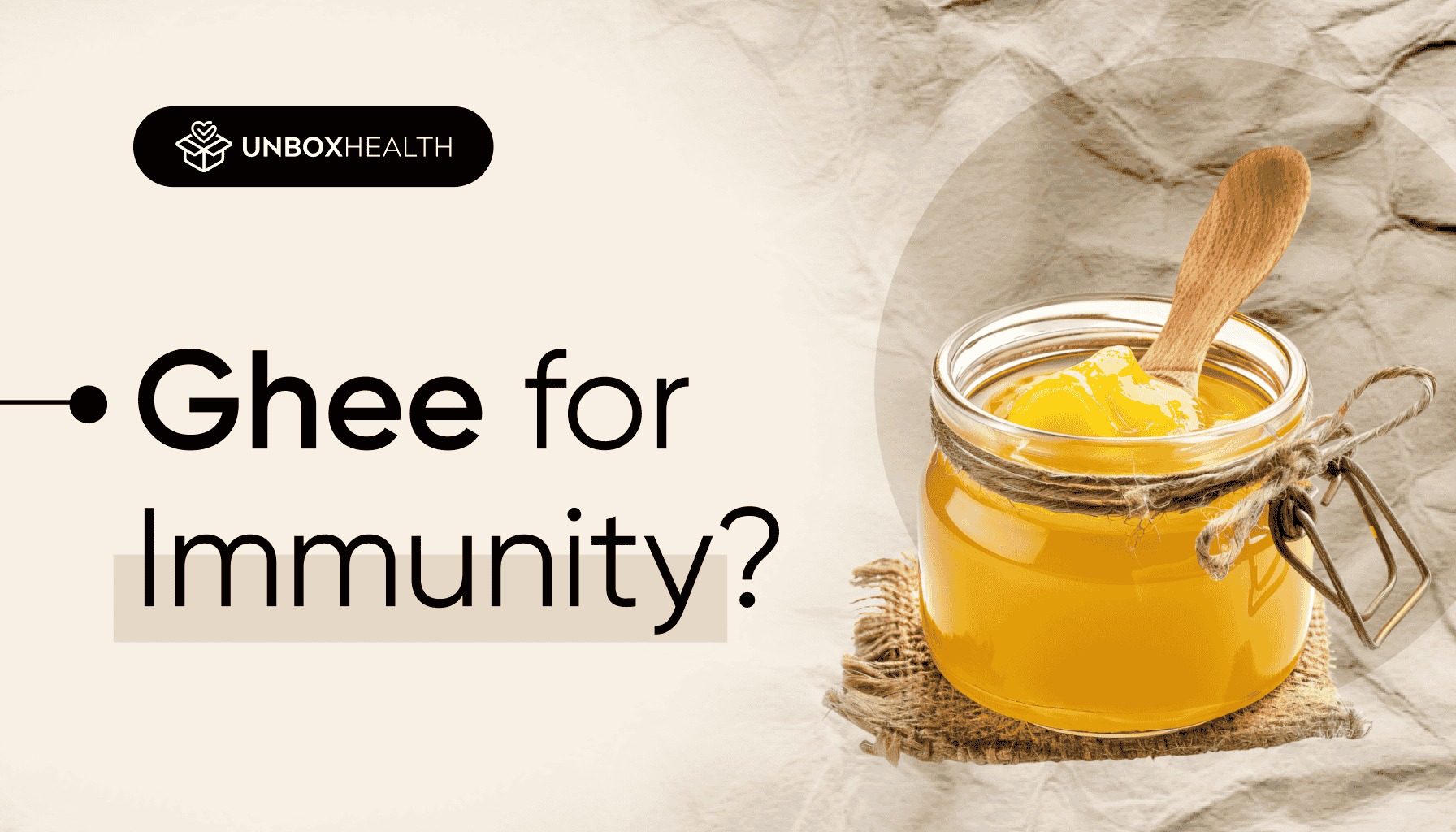Another COVID wave. Another round of panic buying.
We rush to stock up on kitchen essentials like turmeric, chyawanprash, kada, and ghee – our trusted “immunity boosters.” Ghee especially gets a hero’s welcome. After all, Ayurveda swears by it, and dadi always said it keeps you strong.
But here’s the uncomfortable truth:
That jar of “immunity ghee” in your kitchen? It could be doing more harm than good.
With new variants (NB.1.8.1 and LF.7) on the rise and daily cases spiking across Indian cities, immunity is back in the spotlight. Predictably, the market responds with a familiar routine: push every ancient kitchen ingredient as a superfood.
Ghee makes the cut every time.
But is the ghee you’re buying actually helping your immunity? Or is it just heavily marketed junk with a clean label?
Ghee’s Good Reputation Comes from Real Science
Let’s be clear: Real, unadulterated ghee has legit health benefits.
-
- It’s known to be rich in healthy fats that help absorb vitamins A, D, E, and K. (2)
- Pure ghee is rich in butyric acid. Studies have shown that butyric acid can help reduce inflammation and support overall gut health, which aligns with the traditional use of ghee in digestive wellness. (1)
- Due to the presence of butyric acid, Ayurveda has long used it for immunity and vitality, when taken in the right amount. (2)
But that’s not the kind of ghee most of us are actually eating.
Walk into any supermarket and you’ll see shelves lined with “pure ghee.” But look closer, and the illusion shatters.
- Multiple state-level investigations and FSSAI-led surveillance initiatives have found adulteration in ghee samples, with vegetable oils and animal fats being the most common adulterants.(6)
- Some are just hydrogenated oils disguised as ghee.
- Others contain artificial flavors, colors, or preservatives—all masked under fancy health claims.
Bottom line? The ghee you bought to protect your health could be silently harming it.
During a time when we’re all trying to stay safe and boost our immunity, adulterated ghee does the opposite:
- Trans fats and hidden oils? They increase inflammation and mess with your metabolism.
- Preservatives and flavor enhancers? They disrupt gut health, which directly impacts immunity.
- Low-quality dairy sources? You don’t want that in your system—especially now.
So yes, you’re eating ghee. But what you’re really consuming is a mix of confusion, compromise, and clever packaging.
Want Ghee That Actually Helps You? Here’s What to Look For:
1. Desi Cow Milk + Bilona Method
This isn’t a fancy trend—it’s how ghee was always made. Richer in nutrients. Easier to digest. No shortcuts.
2. Zero Tolerance for Hydrogenated Fats
If it says “vanaspati,” “vegetable oil,” or anything vague—drop it.
3. Transparent Label. No Junk. No Guesswork.
Because anything less than full disclosure = red flag.
So… Who’s Unboxing You the Truth?
This is where Unbox Health steps in.
We’re not here to sell you ghee. We are here to expose what’s actually inside it.
🔬 About Unbox Health
Unbox Health: India’s First Ratings Platform for Packaged Foods and Health Supplements
Tired of biased reviews and never-ending claims? At Unbox Health, every product is tested at multiple premium FSSAI-approved NABL-accredited international labs – 100% independently, transparently, and without any brand involvement.
✅ 100% Transparency: All lab reports are publicly published.
✅ Zero Hidden Agendas: Products are market-bought with no brand involvement.
✅ Accurate Testing: Samples tested at up to 3 premium international labs.
✅ Actionable Ratings: Based on Label Accuracy, Toxicity & Nutritional Profile.
Head over to Unbox Health and let the data guide your consumption choices.
Explore Unbox Health’s Ghee Ratings
Is A2 ghee better than regular ghee for immunity?
Yes. A2 ghee from Indian desi cows may be easier to digest and is richer in nutrients like CLA and omega-3s, making it more immunity-friendly than regular ghee.
Can I use ghee daily during COVID or flu season?
Yes, in moderation. 1–2 teaspoons of pure, high-quality ghee daily can support immunity. But avoid ghee with additives or adulterants.
How to choose quality ghee in India?
Selecting high-quality ghee is crucial for health, especially when immunity is a priority. Unbox Health is India’s first independent, lab-tested food rating platform. It evaluates ghee brands based on purity, adulteration, and label transparency, with ratings from A+ to D. A+ means exceptional purity, while D indicates major concerns. Visit Unbox Health’s Ghee Ratings page to explore detailed reviews.
References:
- Canani, R.B., Di Costanzo, M., & Leone, L. (2011). “Potential beneficial effects of butyrate in intestinal and extraintestinal diseases.” World Journal of Gastroenterology, 17(12), 1519–1528.
- Sindhuja, S., Sharma, H., & Kaur, N. (2020). Health benefits of ghee (clarified butter): A review from ayurvedic and modern perspective. IP Journal of Nutrition, Metabolism and Health Science, 3(3), 64–72.
- Nagalla, S., & Reddy, P. (2020). Detection of adulteration in ghee. Biotica Research Today, 2(9), 912–914.
- Gangwar, M., Oja, S., Sakunde, D. T., & Ahmad, J. (2024). Adulteration of ghee and its impact on human health. Agriallis, 6(6).
- Bureau of Indian Standards. (1966). IS 3508: Method of sampling and test for ghee. BIS.
- Food Safety and Standards Authority of India. (2023). Annual report on food adulteration and safety: Highlights on dairy products. Ministry of Health and Family Welfare, Government of India.
